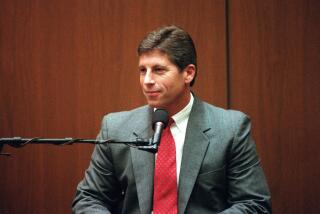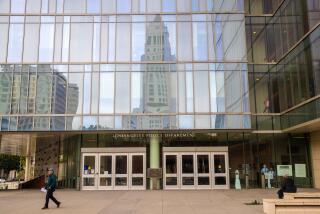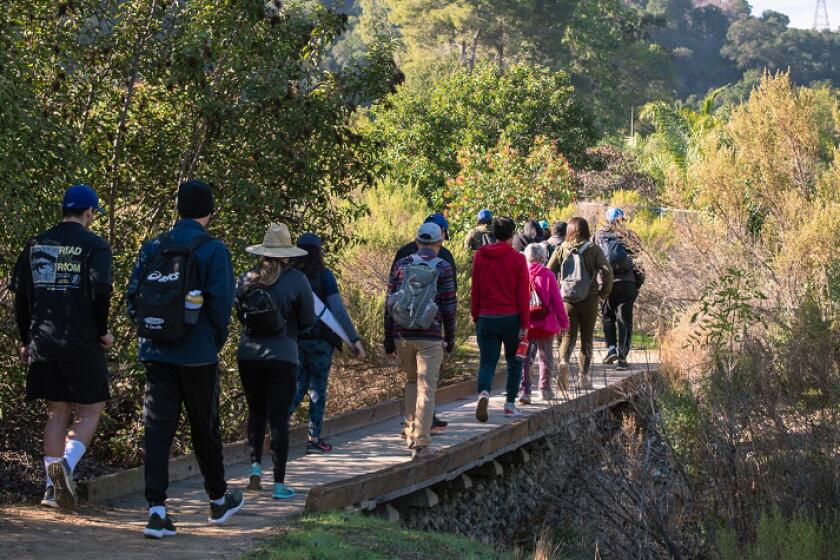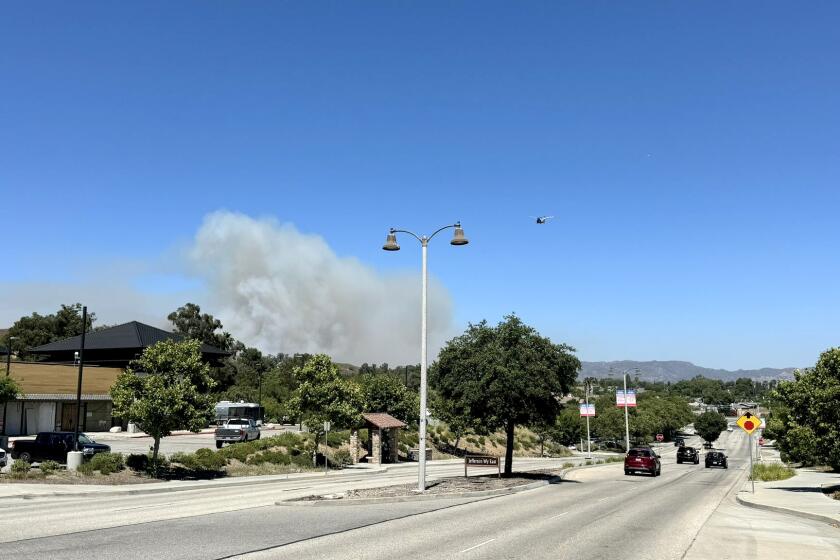Details Emerge of Close LAPD Ties to Simpson
O.J. Simpson’s long and usually friendly relationship with the Los Angeles Police Department snapped into sharper focus Wednesday, as a former officer testified that he often played tennis at Simpson’s Rockingham Avenue estate and had introduced a parade of 40 awe-struck and autograph-seeking colleagues to the former football great.
Former Officer Ronald G. Shipp, taking the stand during Simpson’s murder trial, offered the latest and most specific examples of the closeness that existed between Simpson and police officers at the West Los Angeles Division, charged with patrolling his neighborhood.
Prosecutors have alleged that such a pattern of contacts made Nicole Simpson feel powerless to call on police to protect her from an abusive spouse whose physical attacks, they assert, escalated to murder on June 12. Simpson has pleaded not guilty to charges that he murdered his ex-wife and her friend, Ronald Lyle Goldman.
Since the beginning of the murder case, details have emerged about a number of on- and off-duty contacts between Simpson and LAPD members, raising questions about preferential treatment or inappropriate behavior--which have prompted internal police investigations on several fronts.
* An off-duty officer acting as a private security guard helped Simpson--then a murder suspect--elude photographers after the funeral of Nicole Brown Simpson. That officer, Sgt. Dennis Sebenick of the Harbor Division, was investigated and recommended for a suspension. The status of that punishment could not be determined Wednesday.
* Although Simpson was the only suspect at the time, police officials agreed to let him turn himself in after the murders--a decision that backfired spectacularly when Simpson fled with a friend in a white Ford Bronco, leading police on a widely televised, low-speed chase.
* A police investigation found that the gun Simpson was cradling during the Bronco flight was registered to Earl C. Paysinger, a widely respected lieutenant in the mounted unit of the Metropolitan Division. While off duty, Paysinger has worked as a bodyguard for Los Angeles Raiders owner Al Davis and, sources say, has told investigators that he bought the gun for Simpson to help provide security for the famous running back. A high-ranking police source said the gun purchase did not constitute misconduct.
* In a 1989 incident that led to Simpson being convicted of spousal abuse, Detective John Edwards testified this week that he allowed Simpson to go back inside his home, unaccompanied, to get dressed before being taken into custody on suspicion of beating his wife. To Edwards’ surprise, Simpson jumped into his Bentley and sped from the scene, temporarily eluding arrest. Edwards justified his actions by saying that he did not want to go into the house without backup. Also, noting that Simpson was clad only in a robe, Edwards said he worried that if he brought in such a well-known celebrity “to the station in his underwear, that there would be repercussions because the media would show up and it would be blown out of proportion.”
Simpson’s relationship with the police moved into the heart of the case when prosecutors laid out their allegations about 17 years of domestic abuse that Simpson allegedly inflicted on Nicole Simpson. In a recent court filing, prosecutors included a cryptic footnote that said Nicole Simpson’s “feelings of helplessness and belief that the police would not do anything to the defendant were well-founded.”
“Members of the WLA division of the LAPD frequented defendant’s home, often utilizing the pool and tennis courts. When the officers required the appearance of a celebrity at the yearly Christmas party, defendant eagerly agreed to appear. When the officers desired his autograph on footballs, he responded.
“In turn, the officers responded to Rockingham in response to Nicole’s calls for help 7-8 times prior to the 1989 incident. Each time, the defendant was not arrested and no report was taken.”
Former and current Police Department officials said Wednesday that the fraternizing, some of which took place on duty, was highly inappropriate, if not outright misconduct.
“We encourage the officers to know the citizens in the area that they serve, but we would not encourage them--and certainly would not be happy with them--to go over to a celebrity’s house and get autographs,” said Cmdr. Tim McBride, the department’s head of community affairs. “That would be unprofessional.”
After the prosecution motion was filed, McBride said the department was “reviewing the comments and (making) some inquiries to see what we can come up with. Again, we’re looking back 10 to 15 years ago.” He would not comment on the progress of that inquiry Wednesday.
Shipp’s testimony Wednesday helped illuminate that relationship, giving prosecutors at least two significant strategic benefits. For one thing, it could help explain why Nicole Simpson did not seek police protection more often during the course of an allegedly abusive courtship and marriage.
For another, evidence that officers were charmed by Simpson’s celebrity and hospitality could undermine assertions by defense attorneys that their client was framed by police officers and others involved in the case.
A longtime friend of both Simpsons, Shipp said under oath “I still love the guy” and said he had stopped by the former athlete’s home about twice a week--on and off duty--while working in the West Los Angeles division from 1978 to 1982.
Shipp said he was allowed access to Simpson’s tennis court because “O.J. trusted me.”
Shipp also said that over the years he led a parade of West Los Angeles officers to Simpson’s home to impress them. “If I was on patrol, sometimes I would . . . I would just take people over there. I used to get a kick out of not telling them where I was going and ringing the doorbell and have O.J. come out and greet them.”
“How many other officers would you say you took to Rockingham?” asked Deputy Dist. Atty. Christopher Darden.
“Wow. I’d have to say approximately . . . 40 guys maybe,” Shipp said.
A few officers got autographs from Simpson, Shipp said.
Shipp said that at his request Simpson agreed to appear at the division’s 1980 or 1981 Christmas party. Simpson subsequently stood Shipp up, and the officer had to scramble to find another celebrity, a source close to the case said.
Under cross-examination, Shipp revealed that Simpson got something out of the friendship with him as well. Describing himself as “one of his servants,” Shipp said he “did police stuff for him all the time. I ran license plates.”
After Shipp’s testimony, former Police Chief Daryl F. Gates said it was “highly improper” for officers to socialize with Simpson while on duty.
What would be far more serious, Gates said, would be if the same officers who were socializing with Simpson also were responding to domestic abuse calls at his home. Gates added that he has checked with officers from those years and has found no evidence of that occurring.
Kenneth Hickman, who served as area commanding officer in the West Los Angeles division in 1978 and returned as bureau commander in 1987, said he was not aware that Shipp brought officers over to meet Simpson, but such activities would have been against policy.
“The taxpayers are paying the salary of police officers to answer calls and engage in police activities,” said Hickman, who retired from the department in late 1989 and is now Los Angeles County regional director of the American Cancer Society. “And one of the things that you’re not paid to do is socialize and engage in your private business.
“If what he was saying was that while on duty, he brought officers over to see O.J. to talk and b.s., that would have been misconduct. If I had known about it, we would have investigated it, and we would have taken some disciplinary action against him for sure.”
But Gary Fullerton, an LAPD detective and a director of the Police Protective League, said the contacts with Simpson did not necessarily constitute misconduct, as long as Shipp and other patrol officers were listening to their radios and responding to calls.
“It sounds like community-based policing to me,” Fullerton said. “O.J.’s definitely part of the community. As long as you’re available and not off the air, so you can respond to calls, being out and talking to people is highly appropriate.”
More to Read
Start your day right
Sign up for Essential California for news, features and recommendations from the L.A. Times and beyond in your inbox six days a week.
You may occasionally receive promotional content from the Los Angeles Times.







